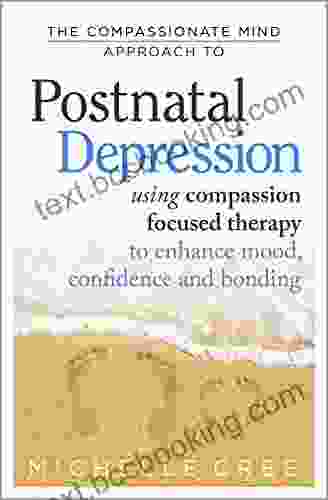Unlocking Postnatal Hope: Embracing the Compassionate Mind Approach

Postnatal depression (PND) is a common but debilitating condition that can affect new mothers in the weeks and months following childbirth. It can range from mild feelings of sadness and anxiety to severe symptoms that interfere with daily life.
4.7 out of 5
| Language | : | English |
| File size | : | 1378 KB |
| Text-to-Speech | : | Enabled |
| Screen Reader | : | Supported |
| Enhanced typesetting | : | Enabled |
| Word Wise | : | Enabled |
| Print length | : | 436 pages |
The Compassionate Mind Approach (CMA) is a promising therapeutic approach that offers effective strategies for overcoming PND and promoting maternal well-being. This article will delve into the causes, symptoms, and the transformative power of CMA for postnatal depression, providing a comprehensive guide for mothers seeking healing and recovery.
Understanding Postnatal Depression
PND is caused by a complex interplay of biological, psychological, and social factors. Hormonal changes, sleep deprivation, and the physical strain of childbirth can contribute to PND risk. Additionally, psychological factors such as a history of depression or anxiety, lack of social support, and unrealistic expectations of motherhood can increase vulnerability.
Symptoms of PND include:
- Persistent low mood and sadness
- Loss of interest in activities
- Anxiety and panic attacks
- Difficulty sleeping or oversleeping
- Changes in appetite
- Negative thoughts about oneself and the baby
The Compassionate Mind Approach
The CMA is a therapeutic approach rooted in mindfulness and self-compassion. It emphasizes the importance of developing a more compassionate and understanding attitude towards oneself, fostering resilience and emotional well-being.
Key Principles of CMA
- Self-Compassion: Treating oneself with kindness and understanding, even when experiencing difficulties.
- Mindfulness: Paying attention to present-moment experiences without judgment, increasing awareness and acceptance of thoughts and feelings.
- Common Humanity: Recognizing that all humans experience suffering and that you are not alone in your struggles.
CMA for Postnatal Depression
CMA has been shown to be effective in reducing symptoms of PND and improving maternal well-being. Here are some of the key strategies used in CMA for PND:
Mindful Self-Reflection
Mindfulness techniques can help mothers become aware of their thoughts and feelings without judgment. This allows them to identify negative thought patterns and challenge unhelpful beliefs.
Self-Compassion Practices
CMA encourages mothers to practice self-compassion by treating themselves with kindness and understanding. This can involve talking to oneself in a supportive way, setting realistic expectations, and acknowledging that mistakes and setbacks are a part of life.
Reconnecting with Inner Strength
CMA helps mothers tap into their inner strength and resilience by focusing on gratitude, values, and positive aspects of their lives. This can help them build a stronger sense of self-worth and cope with challenges.
Building a Supportive Environment
CMA emphasizes the importance of social support and building a network of people who can provide empathy, validation, and practical assistance. This can include family, friends, support groups, or therapists.
Benefits of CMA for Postnatal Depression
Research has shown that CMA can provide numerous benefits for mothers with PND, including:
- Reduced depression and anxiety symptoms
- Improved mood and well-being
- Enhanced self-compassion and self-acceptance
- Increased maternal resilience and confidence
- Improved bonding and attachment with the baby
The Compassionate Mind Approach offers a transformative path for mothers seeking healing and recovery from postnatal depression. By fostering self-compassion, mindfulness, and a supportive environment, CMA empowers mothers to overcome negative thought patterns, build resilience, and embrace motherhood with greater joy and fulfillment.
If you are experiencing symptoms of PND, it's crucial to seek professional help. A therapist trained in CMA can guide you through the process of healing and provide you with the tools and support you need to thrive as a mother.
Remember, you are not alone. With the Compassionate Mind Approach, you can unlock postnatal hope and embark on a journey towards maternal well-being and a fulfilling bond with your child.
4.7 out of 5
| Language | : | English |
| File size | : | 1378 KB |
| Text-to-Speech | : | Enabled |
| Screen Reader | : | Supported |
| Enhanced typesetting | : | Enabled |
| Word Wise | : | Enabled |
| Print length | : | 436 pages |
Do you want to contribute by writing guest posts on this blog?
Please contact us and send us a resume of previous articles that you have written.
 Book
Book Novel
Novel Page
Page Chapter
Chapter Text
Text Story
Story Genre
Genre Reader
Reader Library
Library Paperback
Paperback E-book
E-book Magazine
Magazine Newspaper
Newspaper Paragraph
Paragraph Sentence
Sentence Bookmark
Bookmark Shelf
Shelf Glossary
Glossary Bibliography
Bibliography Foreword
Foreword Preface
Preface Synopsis
Synopsis Annotation
Annotation Footnote
Footnote Manuscript
Manuscript Scroll
Scroll Codex
Codex Tome
Tome Bestseller
Bestseller Classics
Classics Library card
Library card Narrative
Narrative Biography
Biography Autobiography
Autobiography Memoir
Memoir Reference
Reference Encyclopedia
Encyclopedia Martin Miller
Martin Miller Mark Parman
Mark Parman Marianne Slot
Marianne Slot Tod E Bolsinger
Tod E Bolsinger Ray Anthony Shepard
Ray Anthony Shepard Marjorie Savage
Marjorie Savage Maryann Cocca Leffler
Maryann Cocca Leffler Rachel Bryant Waugh
Rachel Bryant Waugh Matt Wastradowski
Matt Wastradowski Wilbur Smith
Wilbur Smith Melanie Mcewen
Melanie Mcewen Matt Brown
Matt Brown Mark Sakamoto
Mark Sakamoto Tony Gemignani
Tony Gemignani Phuoc Thi Minh Tran
Phuoc Thi Minh Tran Wilhelm Johnen
Wilhelm Johnen Yoshitoki Oima
Yoshitoki Oima Paul A Volcker
Paul A Volcker Rowena Bennett
Rowena Bennett Mark Bresett
Mark Bresett
Light bulbAdvertise smarter! Our strategic ad space ensures maximum exposure. Reserve your spot today!

 Gerald ParkerFlyLady's Simple Flying Lessons Will Show You How To Get Your Home And Your...
Gerald ParkerFlyLady's Simple Flying Lessons Will Show You How To Get Your Home And Your... Jacob FosterFollow ·7.5k
Jacob FosterFollow ·7.5k Felix HayesFollow ·9.7k
Felix HayesFollow ·9.7k Hunter MitchellFollow ·12.5k
Hunter MitchellFollow ·12.5k Theo CoxFollow ·3.1k
Theo CoxFollow ·3.1k Cormac McCarthyFollow ·5.2k
Cormac McCarthyFollow ·5.2k Hayden MitchellFollow ·10.2k
Hayden MitchellFollow ·10.2k Terence NelsonFollow ·4.7k
Terence NelsonFollow ·4.7k Harrison BlairFollow ·19.8k
Harrison BlairFollow ·19.8k

 Larry Reed
Larry ReedGwendy's Final Task: A Thrilling Conclusion to a Timeless...
Prepare to be...

 Victor Turner
Victor TurnerHow FDR Defied Polio to Win the Presidency
Franklin D. Roosevelt is...

 Edwin Cox
Edwin CoxWinner RGS BBC Journey of a Lifetime Award: An Inspiring...
In the heart of the world's...

 Griffin Mitchell
Griffin MitchellEverything You Need to Know, You Learned From Mister...
Mister Rogers' Neighborhood was a beloved...

 Beau Carter
Beau CarterSeasons of Terror: A Spine-Tingling Odyssey into the...
In the realm of horror...
4.7 out of 5
| Language | : | English |
| File size | : | 1378 KB |
| Text-to-Speech | : | Enabled |
| Screen Reader | : | Supported |
| Enhanced typesetting | : | Enabled |
| Word Wise | : | Enabled |
| Print length | : | 436 pages |












